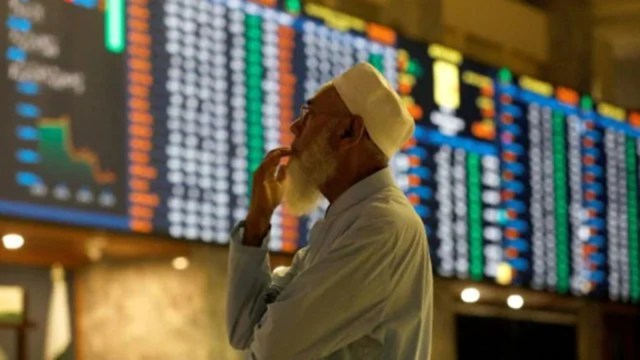Trading at the Pakistan Stock Exchange (PSX) dropped sharply on Wednesday as tensions with India escalated. The market reacted to growing fears of a possible military conflict after a deadly terror attack in Jammu and Kashmir’s Pahalgam that killed 26 people.
Investors React to Security Concerns
The benchmark KSE-100 Index fell more than 2,000 points during early trade. At 10:38 am, it dropped by 2,073.42 points or 1.8% from the previous close of 114,872.18. By late morning, it stood at 113,154.83 points, showing a fall of 1,717.35 points or 1.5%.
This sharp decline reflects investors’ concerns about possible military action. On Tuesday night, Pakistan’s Information Minister Ataullah Tarar said the country had credible intelligence suggesting India might carry out an attack within 24 to 36 hours.
India Hints at a Strong Response
The panic began after Indian Prime Minister Narendra Modi held a high-level meeting with his defence officials. According to Indian media, he gave military leaders full freedom to decide when and how to respond to the Pahalgam attack. This meeting signaled a potential escalation between the two nuclear-armed neighbors.
India blames Pakistan-based groups for the attack, though no group has claimed responsibility yet. Pakistan has denied any involvement.
Market Experts Explain the Decline
Yousuf M Farooq, director of research at Chase Securities, said the fall was caused by fear of a possible conflict. “The market is reacting to the news of a likely attack in the coming days,” he explained.
Fatima Bucha, from AKD Securities, agreed. She said investor confidence took a hit after the government press briefing. “No doubt the market is under pressure,” she added.
Businesses Also Feel the Pressure
It’s not just the stock market. Other businesses are also feeling the heat. Atiq Mir, head of the All Karachi Tajir Ittehad Association, said trade activity has slowed down. “Shops and markets are quieter than usual. People are worried about what may happen next,” he said.
Retailers across the city report fewer customers. Many shoppers are choosing to stay home due to safety concerns.
Regional Tensions Impact Economic Stability
This market drop is one of the largest in recent months. It highlights how quickly regional security concerns can impact Pakistan’s economy. Investors often withdraw or hold back during times of uncertainty, and Wednesday’s drop shows that fear clearly.
Pakistan’s currency and foreign reserves are already under pressure. Any military action or border conflict could further harm economic recovery. According to recent data from the State Bank of Pakistan, inflation remains high, and investor confidence is low due to political instability.
Past Conflicts Still Fresh in Memory
This isn’t the first time tensions between India and Pakistan have affected the economy. In February 2019, after a terror attack in Pulwama, India launched air strikes inside Pakistan. The conflict that followed led to stock market losses and increased military spending.
Many experts fear a repeat of that situation. Both countries have fought three wars in the past, and minor conflicts often raise fears of wider conflict.
Government Urges Calm
Despite the alarming statements, Pakistani officials are trying to ease panic. The Ministry of Foreign Affairs released a statement asking India to act with responsibility and not escalate the situation. Officials also said they are ready to defend the country if needed.
Pakistan’s military has not confirmed or denied the intelligence shared by the information minister. However, the army remains on alert along the eastern border.
Global Community Watching Closely
Countries around the world are watching the situation. Both the United Nations and major powers like the United States and China have urged calm and restraint. Any large-scale conflict between India and Pakistan could have global economic and security impacts.
Foreign investors in both countries are also closely monitoring the situation. Experts warn that ongoing tensions could scare away foreign capital at a time when both nations are trying to boost growth.
What Comes Next?
For now, both India and Pakistan are holding their positions. If diplomatic talks do not take place soon, further instability is likely. Business leaders, investors, and ordinary citizens are hoping for peace, but preparing for uncertainty.

